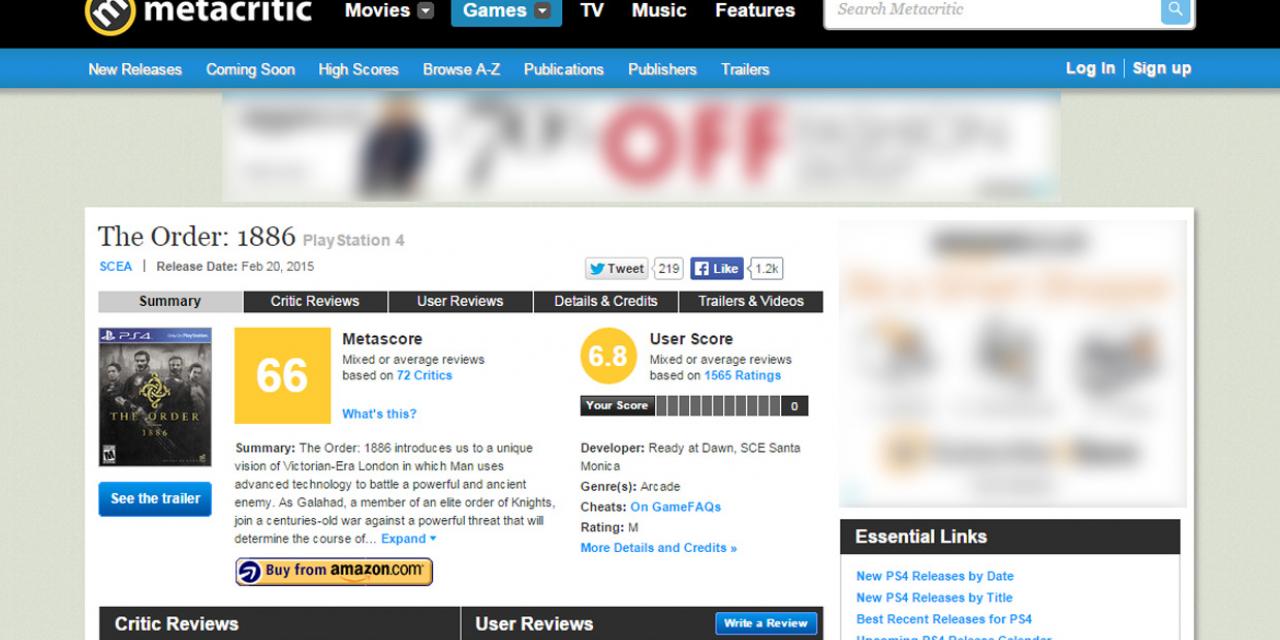
Review scores have been a bit of a hot topic in the past few weeks, with several high profile publications announcing that they would no longer be using them to give readers a percentage, or number based outcome for their thoughts on games they review. This has reignited the discussion in the various gaming communities of whether scores are a good way of rating a game and whether there might be an alternative way of doing things.
Of course, review scores have been considered problematic for a long time already, though not necessarily for the same reason. Traditionally they've been used as a way to aggregate opinion on sites like metacritic, which allow for the combination of all sorts of different thoughts and opinions – user and critic – into a boiled down final score rating of how good a game is.
In practice though that doesn't work very well, as you can have scandals like DRM issues, or server problems creating unrealistic scores of how fun a game is, simply because it didn't work quite right at release. Or you have incidents where reviewers are accused of favouring a game with its rating, even if it doesn't sing its praises quite so much in the less considered text of the review.
And that's not even factoring in that a lot of publishers consider high metacritic scores as the holy grail of their games' development and distribution, which prompts practices that might sway a reviewer to give a higher than average score: inviting them to a private testing event with bespoke machines and builds of a game, rather than release software; giving them a version of the game that's different from the one that consumers might get to play; or having them play a multiplayer game before release when server crowding won't cause any problems.
Ultimately though, as problematic as all of these issues are, the real issue with review scores is that they are not an accurate way to judge an artistic medium. Nobody would ever consider judging paintings by some of history's greatest artists on a scale of 0-100, yet for some reason with movies and games, we do just that on a regular basis. There's a reason some of your (and certainly my) favourite movies don't have perfect scores on IMDB or Rotten Tomatoes: because everyone's tastes are different.
The same goes for games, but when you throw in the increased technical aspects of player input, multiplayer networking and the potential for bugs and problems and there's a whole other layer of complexity that cannot be expressed by a mere number.
How do you score a game that is fantastic to play, but only boots every third try? What rating do you give a game that has a very unique art style which appeals to some and not others? Can themes considered offensive by some, really sink a game that is otherwise perfect?
How do you judge how good a game is based on a number anyway? Do you buy everything that's over 85? No, you still look into it to see if it's worth it. So why not do away with the number altogether?
This is why it feels like we're moving in the right direction by edging away from review scores. They are awash with sevens and eights anyway, as for the most part developers do a good job.
But how then do we know what's good and what's not?
Some sites have begun adopting new systems where they offer recommendations rather than scores. Should you play the game now? If so, why, if not, why not? What are some of its pros and cons? That works as a system, and should always continue to do so.
Something else that could be considered would be a "if you liked X, you'll love this," which gives people a frame of reference. The real end game here though is more demos. The best way to find out if a game is good for you and you alone, is by having a play of it.
We can't go back to the past, where demos were distributed on discs stuck to the front of gaming magazines and we can't really do digital downloads like we have in the past, as beyond the fact that they tend to impact sales negatively (since the demo sometimes scratches the 'itch' that the player has to play that particular game), they're expensive to make as they are a very specific build of the game, or require massive downloads since you're downloading almost the entire game.
The system that could fix all of this is Gamesessions, which is looking to partner with publishers to make full games available for short periods of time. That way, when the time is up, gamers can either pay up to play the rest of the game or uninstall it without feeling cheated.
Of course like every system this will no doubt become exploited in the long run, with developers making games that play and look amazing for half an hour and then fall flat afterwards, but that's way down the line. For now, we need to fix the problem with review scores and I say that a more nuanced review system is a good way to start, but that demos are the real key to success.
What do you think?
